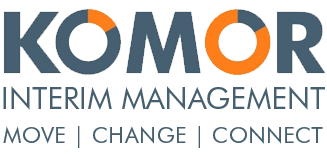Through the Independence I became a tiger on the hunt
Ralf H. Komor is an Interim Manager, book author and absolute B2B sales professional. Clients ranging from corporate groups to small and medium-sized businesses benefit from his 30 years of experience in national and international projects. He is recognised in the industry as a thoroughbred salesman and heads the DDIM.fachgruppe “Sales & Marketing”. He is also co-author of the book project “Chefsache Interim Management”, which was published this year by Springer-Verlag.
In an interview with division one, Komor talks about his experiences that he has had in his previous self-employment as a temporary manager and reveals valuable tips for newcomers to the Interim Market.
Ralf H. KOMOR in an interview with Sarah Neitzel, Social Media Manager of the Interim Management Provider division one, Stuttgart
Mr Komor, you are an Interim Sales Professional – how would you describe your job to a person from outside the field?
As an Interim Manager, I am temporarily employed by and for companies in the sales environment. My work goes beyond that of a consultant or project manager – I see myself as an assertive and goal-oriented implementer who takes on the customer’s demand and can deliver results quickly. My ambition is to get to know important processes and structures within the shortest possible time and to get a feel for the market, competitors and customers.
“I was tired of corporate careers and resentment…”
Why did you swap your permanent position for project-based self-employment?
Experience shows that self-employment in Interim Management is rarely planned. Often, and this was the case with me, you slip “spontaneously” into your first project. In my case, two factors came together. On the one hand, the frustration resulting from the political and structural barriers to permanent employment – I no longer wanted a corporate career or resentment and was open to change. Then came an attractive offer from an Interim Management Provider for a suitable mandate in 2014. The client liked my presentation, decided on me the same day and the following week I started – that was my start. Today, five years later, I could not imagine a more exciting job. I am burning for success and my task to be able to advance companies or teams.
“By becoming self-employed, I became a tiger on the hunt.”
What has changed fundamentally since you became self-employed, professionally and privately?
Professionally, a lot of fun. Project work brings with it a great deal of variety, both geographically and in terms of the company, the employees and the activity itself. Despite or even because of the limited time in the project, I do not feel or behave like an “outsider” – in this period of time it is my company, my employees and my customers for whom I give 100%.
For me personally, instincts have changed. Metaphorically speaking, I was a bear in the shelter of its den during my permanent employment. Through the self-employment I became a tiger on the hunt. This change of perspective has made me feel calmer inside. In a permanent position, people like to feel safe, which often goes hand in hand with a passive attitude. Unforeseen, unpleasant events hit all the harder. As a freelancer, I am constantly moving outside my comfort zone, which means I am mentally prepared for everything and can act on my own responsibility – this gives me a feeling of security.
How did you manage to hold your own on the competitive Interim Market?
Through excellent performance, a professional public image and a well-maintained network. The effective implementation of technical know-how is of course the basic requirement. In this way, positive references are collected, which in turn are important for project acquisition. In addition, I regularly invest in my professional and personal development by attending training courses or lectures by successful speakers – such events are also a great way to expand your network.
What would you advise Interim Newcomers to start with?
To be sure of their cause! Many beginners do not know what to expect when they become self-employed. For more transparency I recommend the exchange with experienced colleagues. I personally advise every interested person to create a financial cushion to bridge nine months before starting self-employment.
As an Interim Manager, three qualities are essential: openness, flexibility and dedication. You also need the necessary expertise, a top positioning and an authentic appearance – both in the analogue and online world.
“Focus on strengths rather than weaknesses.”
Let us talk about your online presence. How important is it as a marketing tool and what should be considered?
The internet presence, which for me includes above all my own homepage and a profile on Xing and LinkedIn, is basically my digital business card. Here it is particularly important to create a recognition value. Be it via your own logo, a specific design or the visual language, which run like a red thread through the presentations and can be called up fully responsive on the smartphone or tablet. For the construction of my homepage an agency supported me. The positioning, on the other hand, has to be worked out by everyone for themselves – from the inside out. Questions that may help: What is my passion? What are my strengths? In which areas has my success been particularly appreciated in the past? Besides the right questions, a realistic self-assessment plays a decisive role. This can be usefully supplemented by digital personality tests and honest input from friends and family. My personal tip: rather focus on strengths than trying to compensate for weaknesses.
What are the criteria that determine whether you win a mandate?
My availability, the “cultural fit” and my professional know-how. The daily rate is rather secondary and in my case not negotiable – I know my value. The difficulty is not so much in getting projects, but in the art of choosing the right offer. By right I mean the professional and personal fit. If I am asked for a new mandate, whether through an Interim Provider, Xing, LinkedIn or my personal network, the first thing to clarify is with what intention the company wants to bring me on board as an Interim Manager. It is important to know the expectations of the client in order to steer all steps in the right direction. The “cultural fit” plays a particularly decisive role: Does the Interim Manager have the right stable smell, does he fit in with the company culture, will he be well received by the employees?
“The key competence is change management.”
What added value do Interim Managers provide for companies?
In addition to their professional specialisation, temporary managers have broad management experience. The key competence is change management: 94% of Interim Managers have change experience, compared to only 65% of permanent managers. He has an extensive portfolio of suitable instruments at his disposal and is also the ideal discussion partner for all members of a company. He can share his findings with stakeholders unfiltered and without vanity. He is the driver with a high analytical ability and implementation strength. He solves the tasks at hand independently, without a crowd of further helpers. Thanks to his many years of specialist expertise and regular training courses, he is always close to the pulse of the times and always one step ahead of his customers in terms of expertise.
Why would you recommend experienced managers to take the path to Interim Management, what are the advantages?
Flexibility: You work as a self-employed manager, so you are not tied to a specific company and can freely choose after the end of the project whether to continue immediately or to take some time off.
Variety: Switching between cities, regions and industries is part of the essence of Interim Management. Over the past four years I have had five different clients in five different industries, with projects ranging from six weeks to 18 months and 300 km to 600 km from home.
Intensity: It is very intensive work, because clients usually call in Interim Managers in special situations or in the context of company sales. You need a quick grasp of the issues, corporate cultures, industries and technologies that change from client to client in a short period of time.
“Interim Manager is the right profession for all those who want to approach ever-changing tasks undogmatically and have a strong track record in their specialist discipline.”
When you think back, what have been the biggest challenges during your self-employment so far?
The administrative part of self-employment should not be underestimated. The sales tax return, writing invoices, etc., everything must be done on time at the weekends. My personal tax tip: spend less than you earn and don’t forget the income tax advance payment in the third year. In addition, every now and then the daily work routine itself can be challenging. As an Interim Manager, you do without your usual private life and circle of friends during the week, as you definitely do not have a nine-to-five job and, if the workload is good, you can expect over 200 hotel nights per year. Since you usually run the business as a single person, there is little chance of scalability.
What is your forecast for the development of the Interim Market in the next 10 years?
Positive – many are only now seeing the interim solution as an opportunity. The advantages are obvious: The costs for Interim Managers are clearly calculable, the risk is very low due to short notice periods, but the Return on Interim Management is extremely high with a factor of 10 and more. Demand will also continue to rise as the shortage of managers in companies becomes increasingly evident. Due to the good economic situation in the DACH region, there is an ever higher fluctuation at director level and, in parallel, an ever shorter retention period for managing directors and board members, which is currently only 5.1 years. This is fuelling demand for temporary support at management level, as there are currently many vacancies to be filled.
Recently your expert book “Chefsache Interim Management” was published by Springer-Verlag – what are your experiences as co-author?
You first have to jump over its shadow and then make an insane amount of effort. In the best case you get into a flow and don’t want to stop. You educate yourself and learn a lot in the process. The quintessence of my textual contribution in the book are the 10 theses on distribution in digitalisation. If you would like to know what the modern distribution of tomorrow will look like and would like to prepare for it, I recommend that you take a look at the reading.
“The art is to live in the now and still have an idea of what tomorrow will bring.”
What is your motto in life?
“There are two days in life you can’t change, yesterday and tomorrow.”
For my Interim work, this means that I do not evaluate the past (negatively), but focus on what I can actively improve today. Accusations are not a good motivator. The art is to live in the now and still have an idea of what tomorrow will bring. Everyone can get better every day.
Source: Sarah Neitzel, Social Media Manager of division one, Stuttgart
I SUPPORT YOU ON THE WAY TO YOUR SUCCESS
I am a strategist, an innovator, an unconventional thinker, a mover and shaker and therefore I do the right things sooner and better.
And with pleasure also for you.
Together we can discover new market opportunities, steer product branding into the right direction, understand your customers better – and stand out from the competition with tailor-made products for your target group. All this leads to more customer satisfaction, greater customer lifetime value and more sales potential.
Can you afford not to go for it?







